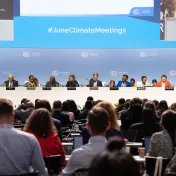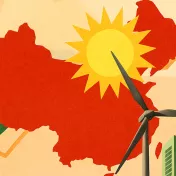Russia, the world’s third largest oil producer, is caught between two futures: diversify its fossil fuel based economy in response to changing energy markets and the end of the raw super cycle, or to restore Russian positions in fossil energy markets. While Russian leadership is torn on the subject, the future of the 1.5 degree goal hinges on the direction the nation will take.
Russia is the world’s third largest oil and sixth largest coal producer. About 90% of its primary energy comes from fossil fuels, and up to a quarter of the state budget is formed through the export of oil and gas. Russia – representing 4.7% of global fossil CO2 emissions - has signed, but not yet ratified, the Paris Agreement. The country adopted an extremely unambitious national contribution of 70-75% of 1990 levels by 2030 – a goal already reached in connection with collapse of the Soviet Union, even without considering the contribution of forests. Still, the signing of the Paris Agreement in April 2016 triggered a powerful behind-the-scenes struggle between two camps – those that support the modernization of the energy sector and diversification of the economy, and those in favor of maintaining the status quo, with virtually the whole economy based on extraction and export of oil, gas and coal.
For the former, the global development of green energy as well as excessive requirements in the field of environmental safety are considered as threats to Russia's economic security. Basic indicators of the Russian Energy strategy suggest that Russia remains committed to the existing fuel mix at least until 2035. At the same time, parts of the country’s leadership and business community perceive green energy and environmental standards as an opportunity. This is reflected in President Putin's statements in support of the non-oil sector of the economy, but also seen in actions. For example, the state-owned nuclear energy monopolist Rosatom is starting to diversify its business and participate in projects to develop renewable energy sources (RES).
Russian emissions have stabilized at approximately the same level for more than 20 years, despite the country’s growing GDP since 1998. This "decoupling" was mainly due to structural reorganization of the Soviet economy, as well as the rising oil prices at the turn of the century. Still, first steps towards a greener economy have been made. In 2013, a federal law on improving energy efficiency was adopted with the goal to reduce energy intensity of GDP by 13.5% by 2020 from 2007 level. And a RE-target of 2.5% (excluding large hydro) of power production (or 6 GW capacity) by 2024 was installed by another order.
However, these attempts are dwarfed by the potential of modernizing the Russian fossil energy sector. Currently, almost every other ton of oil, coal and cubic meter of gas are wasted. If the Russian energy industry became energy efficient, it would reduce global CO2 emissions by about 2%. But planned investment into energy efficiency in Russia is 10 times less than in new oil and gas developments. Among these programs of the fossil industry are many alarming projects such as Arctic offshore oil projects, and new coal mining, and onshore oil and gas development in the Arctic.
The government forms and supports advanced fossil development through direct subsidies to the Russian oil industry, exceeding 10 billion dollars a year. In addition to direct subsidies there is indirect subsidizing through low environmental and social standards, and the government turning a blind eye. Residents of many regions are beginning to oppose numerous oil spills, which according to the Minister of Natural Resources of Russia reach 1.5 million tons per year and for which the oil companies practically do not bear financial responsibility. Coal companies actively reduce expensive underground mine production and start surface coal mining as close as 1000 m to residential buildings. Many mountain dumps remain uncultivated, and areas of sea terminals for transshipment of coal face huge problems with air pollution.
Given that status quo, the question of fossil fuel subsidizing phase out is practically not considered in Russia, and the issue of introducing carbon trading or a tax on greenhouse emissions meets with fierce criticism. Transition to 100% renewable energy or a goal of 1.5 degrees are not even part of the conversation.
But the fossil fuel castle starts to crack because of economic shocks from outside. Any decrease in the consumption of oil and gas in the world market, as well as a drop in energy prices, immediately affects the federal budget. The current situation with the slowing growth rate of China's GDP, oil and gas surplus at global market and vulnerability of the Russian oil economy to Western sanctions is sharpening the debate about the country’s future.
At the same time, Russia is extremely vulnerable to effects of climate change, such as increasing number and strength of unfavorable weather events, thawing of permafrost that supports infrastructure such as oil and gas pipelines, nuclear reactors and large dams, heat waves and forest fires. According to Russia’s environment minister, Sergey Donskoy, forecasts suggest that climate change-related losses may reach as much as 1 to 2 percent of the country's GDP by 2030.
The government now has 2 options: to adapt to changing energy markets and start developing new technologies within Russia, as advocated for example by the Chair of the Central Bank of Russia, Ms Nabiullina, or to restore Russian positions in oil, coal and gas markets (for example, through an agreement with OPEC or further price dumping for extractive companies), as many government documents still suggest.
The choice will largely depend on the highest level of Russian political leadership. In this sense, such summits as the G-20 and direct signals to Russia's top political level from the political leaders of Russia's trade partners in the G20 are extremely important. The future of the global energy transition also depends on whether Russia remains a quiet haven for the international oil industry thanks to its extremely low environmental and social standards.

Wladimir Tschuprow (Greenpeace Russland)
- With financial support by Stiftung Mercator. The Author and Germanwatch are responsible for the content. -




